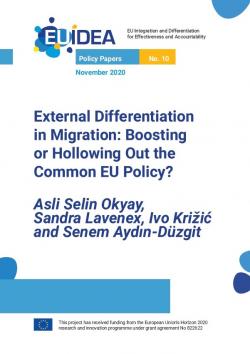External Differentiation in Migration: Boosting or Hollowing Out the Common EU Policy?
The growing weight given to external cooperation leads to increasing participation by non-member states in EU migration and asylum policy, in both regulatory and organisational terms, constituting instances of external differentiation. This paper analyses the causes, shapes and effects of external differentiation. By examining the cases of Libya, Morocco, Turkey and Western Balkan countries, we demonstrate that the multiplicity of actors, venues and levels governing EU migration and asylum policy plays a significant role in driving and shaping external differentiation. We argue that the effects of external differentiated integration (DI) mechanisms on migratory pressure are relative and limited to the short run. Increasing intergovernmentalisation and informalisation of external differentiation has, however, significant repercussions on the EU’s internal normative standards. We conclude that external DI mechanisms should be a complement to and not a substitute for comprehensive internal policies; and that external DI should go beyond a narrow focus on migration control and ensure full compliance with the EU system of rules regarding human rights, asylum and international cooperation.
-
Details
Rome, IAI, November 2020, 21 p. -
In:
-
Issue
Policy Paper 10
Executive summary
Introduction
1. Causes and shapes of external differentiation
1.1 Libya
1.2 Morocco
1.3 Turkey
1.4 Western Balkans
2. Effects of external differentiation: Reducing short-term migratory pressure at the expense of normative standards?
2.1 Do external DI mechanisms reduce migratory pressure?
2.2 Does external differentiation undermine EU normative standards?
Conclusions
References



